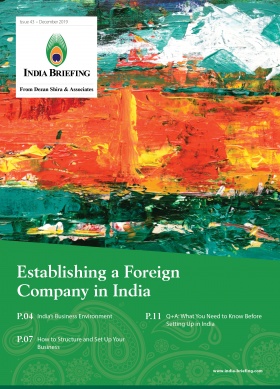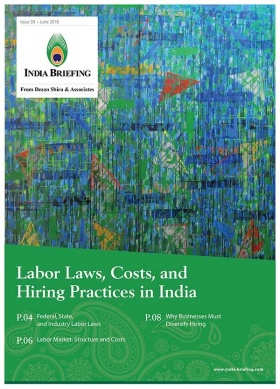The Top 5 Trends in India’s HR Industry in 2020
India has seen some significant changes in its human resources (HR) industry over the last five years.
New priorities have included creating a diverse workforce, establishing gender parity and pay equality, providing mentorship, and assuring safety at the workplace.
Moreover, companies and start-up enterprises alike now view hiring in more holistic terms while job seekers choose their employers based on a wider criterion than salary growth, particularly in the initial stages of their career.
Also, as India enters 2020 amid an ongoing economic slowdown, HR departments across its corporate landscape will be expected to ensure the most efficient utilization of resources through increasing reliance on technology for recruitment, onboarding, and performance management.
In this article, we spotlight the five big trends expected to dominate India’s HR industry in 2020.
1. AI to become a standard tool for recruiters
The HR industry is already familiar with artificial intelligence (AI) powered solutions for talent acquisition. In the last few years, AI has reduced the time taken at the recruitment phase by removing the need for managers to manually browse hundreds of applications.
This has given hiring teams more time to perform higher value work, such as broadening engagement with candidates, recruitment marketing, organizing mentorship and training programs, among others.
In 2020, AI integration will be used across employee-facing applications and software to drive productivity and engagement within the organization.
Further, AI powered virtual assistants will start to be used more widely in the workplace. Meanwhile, the technology to automate repetitive routine tasks will continue to improve, enhancing productivity in organizations.
2. Growing usage of data analytics
It is anticipated that in 2020 HR teams will begin to use data analytics in a more focused manner – to increase productivity, innovation, and revenue at the workplace. This will facilitate the creation of employee-centric environments, in turn driving up the role and importance of data driven strategies.
For example, through access to the organization’s large database of employee information, specialized HR personnel will be able to understand employee behavioral patterns with regards to retention, recruitment, development and engagement, satisfaction, performance, and productivity, among others.
HR managers can then track metrics, such as offer acceptance rate, training expenses per employee, turnover rate, human capital risk, and revenue per employee. Data from these key metrics will improve the employee experience and hiring process, reduce attrition, and make the workforce more productive.
Use of data analytics may also help HR departments identify future risks and vulnerabilities in the organization so that effective solutions may be applied right away or problematic situations may be recognized and resolved.
3. Blacklist for CV fraudsters, emphasis on background checks
According to a recent report, to counter inaccuracies in candidate CVs, the HR industry is collectively working to create a master blacklist. Expected to be completed by June 2020, this list will include major and minor discrepancies in a candidate’s resume. The collaboration is important as data show that candidates frequently misrepresent their employment related information.
Further, since hiring needs are now commonly outsourced to third-party recruitment firms, the blacklist will be key to selecting qualified candidates and minimize the scope for fraudulent candidates infiltrating the hiring firm.
Based on the type of inaccuracy, a score will be assigned to each candidate, and details will be stored with recruitment firms. When the candidate applies for a job, details of their CV and past discrepancy will be passed on to the organization. Then, the company will take a final call about interviewing and/or hiring the candidate.
In addition, multinational companies in India are now conducting background verification before hiring selected candidates. This practice is likely to spread as an industry best practice in the coming years.
4. Impetus to create a healthy work culture will add value to HR roles
Employees now look for organizations that nurture their talent, provide them with opportunities to grow, and offer a supportive and healthy work culture.
In a study conducted in India by Randstad, a human resource consulting firm, almost 46 percent of those surveyed stated their preference for work-life balance in their jobs, and 36 percent said they would leave their jobs because of a poor work-life balance. Around 43 percent stated they would leave their jobs because of limited progress in their career path.
Therefore, creating a healthy work culture in order to recruit and retain employees is of utmost importance.
Along with creating a safe and harassment free workplace for employees, HR managers will need to work harder to communicate the company’s culture and its values to the employees.
This includes creating opportunities for mentoring and leadership, closing the gender and pay gap, promoting more women to executive positions, and support for employees pursuing further education or skills development.
5. Marketing and branding will be an integral part of the HR function
The role played by HR departments will continue to evolve in 2020. Along with their traditional responsibilities, HR managers will now be expected to work more closely towards employer branding.
This is because as HR operations increasingly digitize, their role becomes more closely aligned with marketing goals. For instance, during the talent acquisition process, firms employ social media marketing to attract the best hires. Here, HR personnel contribute greatly in building the brand that will excite potential employees and motivate them to choose to apply to the organization.
Recruitment online has never been as easy – with the proliferation of platforms like Quora, Glassdoor, and LinkedIn. At the same time, it has created new challenges. The reputation of a firm could easily be maligned by a bad review or comment by a current or former employee. In a post-Me Too era, hiring managers will be expected to prioritize building positive work environments with zero tolerance for harassment and discrimination.
India Briefing is produced by Dezan Shira & Associates. The firm assists foreign investors throughout Asia from offices across the world, including in Delhi and Mumbai. Readers may write to india@dezshira.com for business support in India.
- Previous Article Year in Review: What Foreign Investors Expect from India in 2020
- Next Article India Mandates Financial, Secretarial Audit for Private Firms with Outstanding Debt







